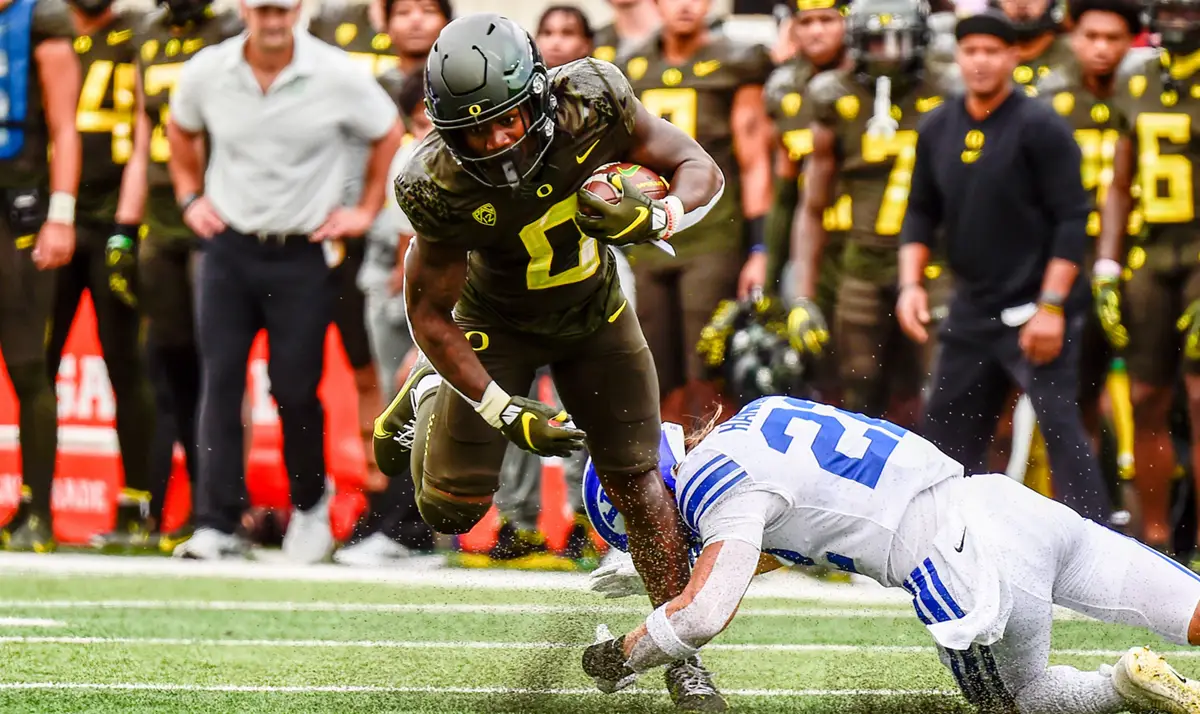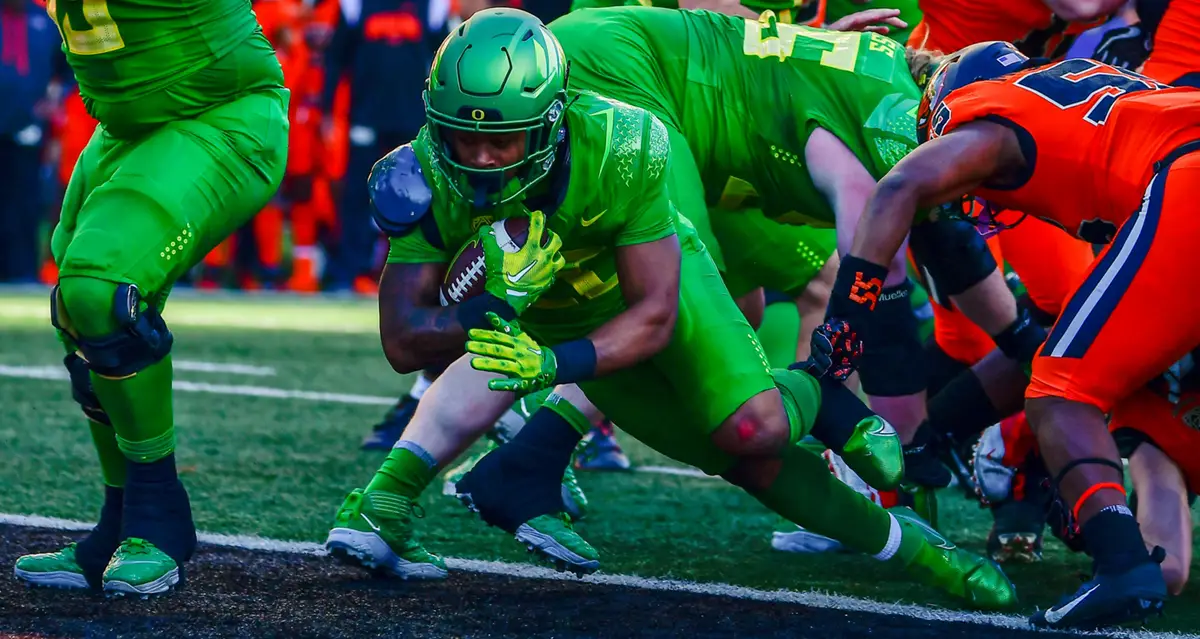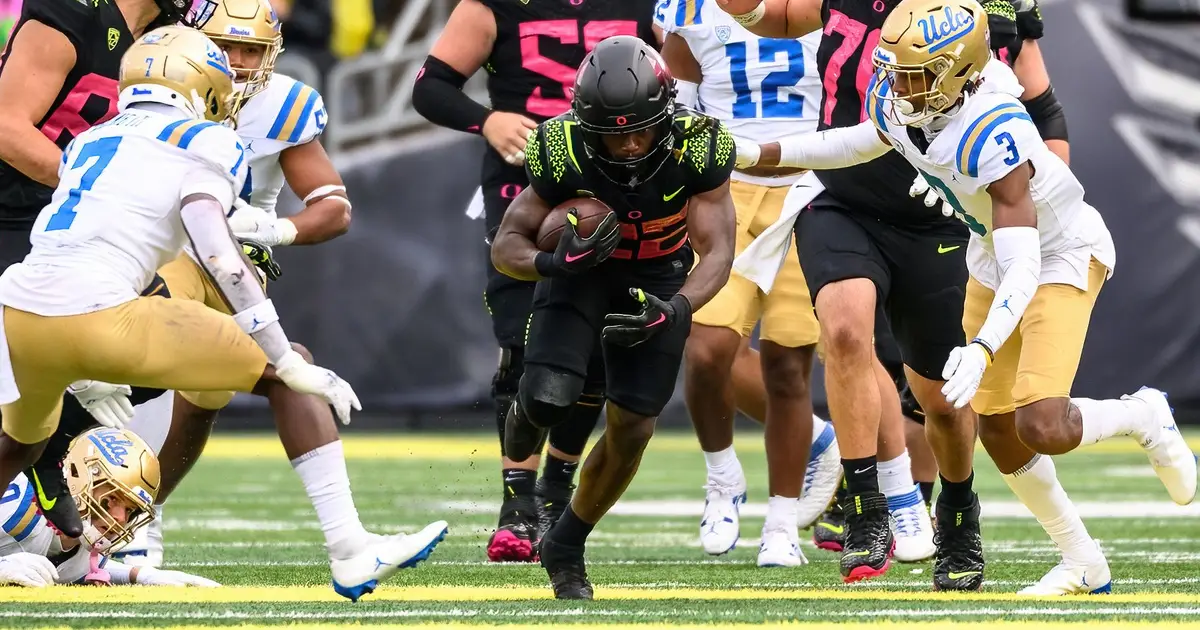Since the firing of Mark Helfrich after the 2016 season, and through the Willie Taggart and Mario Cristobal eras, we’ve heard a lot of talk about Oregon’s identity as a program. We have seen teams range from high-scoring offenses like those under Chip Kelly, Helfrich and Taggart to low-scoring nail biters from the Cristobal era. But there is one thing that has been true through all of that Duck history — the run game is central to Oregon’s success.
As we approach the conclusion of the 2022 season with first-year head coach Dan Lanning, we have seen what happens when Oregon abandons the run, even for a short period of time. In Oregon’s three losses this season to Georgia, Washington and Oregon State, all saw the offense stall out at key moments — and in all those moments, Oregon went against its identity.
A Game 1 Lesson
So much went wrong against Georgia, but the one thing that was going right for Oregon throughout the game was the Ducks’ success in the run game. Oregon averaged 4.5 yards per carry against the Bulldogs in Game 1 this year. That is 1.5 yards above Georgia’s defensive average on the entire 2022 season. Oregon was able to move the ball in the run game and put together a few drives that looked successful, but they stalled out when now former offensive coordinator Kenny Dillingham leaned too hard on the passing game.
Bo Nix is a good passer, but he isn’t the type of quarterback that you want to throw 40 times a game — and putting the game entirely on his arm is a recipe for disaster. It gets the whole team out of rhythm and puts Oregon behind schedule. Nix has shown time and time again this year that he is at his best if the run game is producing yards and the Ducks aren’t faced with too many 3rd-and-long situations where the Ducks need to pass. The run game produces good chunk yardage behind a veteran and well coached offensive line with a bruising running back duo in Bucky Irving and Noah Whittington. It is folly to abandon the run when we have players like this on the field.

Bucky Irving has been difficult for defense’s to tackle this year. Why not lean on him when it matters most?
The Washington Disaster
This might seem weird at first glance because the play that has now been talked to death by Oregon fans was, in fact, a run play. It was 3rd-and-5 and Nix was in an empty set. He an the ball straight down the middle to try and pick up a first down, and failed, but was also injured in the process.
This was a part of what could have been a game-winning drive that lasted for more than 10 minutes, which started after linebacker Jeffery Bassa got a key interception at the Oregon one-yard line. This offensive series was effectively all run plays. It chewed through the Washington defense and almost burned the entire clock for the quarter. Furthermore, this drive was basically all hand-offs to running backs as Nix didn’t have a designed run play until that fateful third down.
This was power football where the offensive line, Irving and Whittington just demolished Washington. So why in a 3rd-and-5 situation, where the intention was to run the football, in which Nix didn’t even pretend to look to pass (he simply took the snap and started running), would the Ducks not hand the ball off to Irving or Whittington, or at least have them in the backfield with Nix to give the illusion of a handoff?
This was a play that went against Oregon’s identity and put the quarterback at risk when there was no need, when putting the ball in the hands of a running back would have been the best decision both in terms of the overall health of the team and also in terms of game management.
What Happened Against Oregon State?
Nix’s injury limited Oregon’s offensive playbook. That much is true. Nix really didn’t try to run on plays while Oregon controlled the game, but that didn’t mean that Oregon’s run game didn’t work. The Beavers have a solid run defense but Oregon’s running backs were still running for good yardage against them — until Oregon started to panic. The defense just collapsed and Oregon’s offense entered a must-score situation.

Freshman Jordan James has been fantastic in short yardage situations this year.
With plenty of time on the clock, and with Oregon still leading so burning clock was Oregon’s friend, Oregon started calling for play after play where Nix was throwing the ball. This set up several third-and-long situations that became fourth-and-long attempts that failed. So what happened to Oregon’s run game? It just disappeared, and Oregon yet again didn’t even pretend like they were interested in running the ball as there wasn’t even a running back in the backfield with Nix.
But what about the Utah game? Oregon couldn’t run the ball effectively against Utah, and yet the Ducks still won. The Utah game was an anomaly in terms of the season, because it was a game in which Nix had to throw the ball because Utah sold out to stop the running backs. Oregon’s offense was pretty ineffective in the second half against Utah, but Oregon’s defense stood strong and won the game, something that cannot normally be relied on this year.
Oregon’s success this year, and all previous years, has been built on a solid rushing offense. So why go against it when things get desperate. We saw how good things can be when Oregon leans on their rush offense this year while down. Look at the Washington State game where Oregon was down and they start to claw back into the game because they lean on their run game, and that sets up easy third down situations and opens up the passing game for Nix.
Whoever Lanning hires as his next OC, he needs to find someone who understands how the run game is in Oregon’s DNA and isn’t afraid to lean on the run game to set up the pass. Not to the point of mindless stubbornness, but when there is success in the run game, it typically leads to good things happening in other parts of the game.
David Marsh
Portland, Oregon
Top Photo By Craig Strobeck

Natalie Liebhaber, the FishDuck.com Volunteer Editor for this article, works in the financial technology industry in SLC, Utah.

David Marsh is a high school social studies teacher in Portland, Oregon. As a teacher he is known for telling puns to his students who sometimes laugh out of sympathy, and being both eccentric about history and the Ducks.
David graduated from the University of Oregon in 2012 with Majors in: Medieval Studies, Religious Studies, and Geography. David began following Ducks Football after being in a car accident in 2012; finding football something new and exciting to learn about during this difficult time in his life. Now, he cannot see life without Oregon football.


